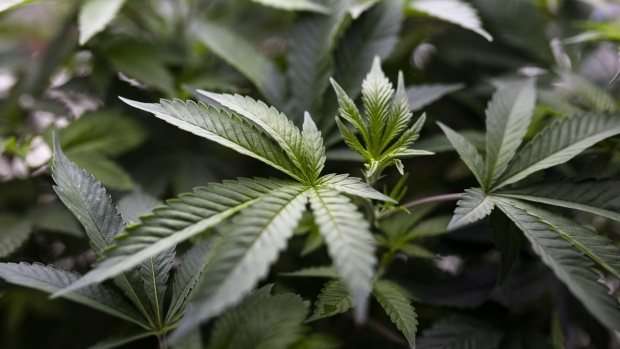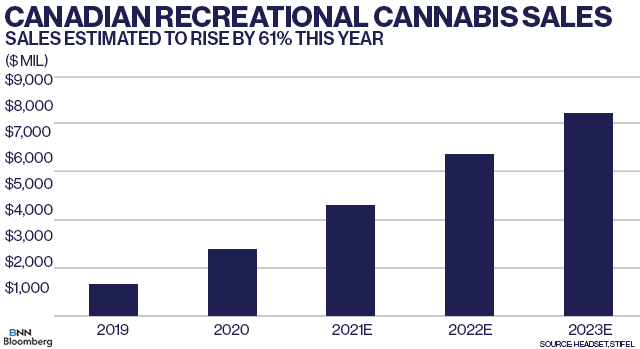Mar 5, 2021
Cannabis Canada Weekly: Ontario captured 40% of legal pot market in 2020, still lags national share
BNN Bloomberg

Ontario captured 40% of legal pot market in 2020, still lags national share
After two years of legalization, Ontario continues to eat away at the illicit cannabis market.
Data provided by the Ontario Cannabis Store (OCS) shows that the province secured roughly 40 per cent of the legal market by the end of last year. That's more than double what the legal market controlled a year earlier, but still lags behind the 52 per cent of the national legal share of recreational cannabis sales, as COVID-19 lockdowns weighed on retailers.
"It's all about access," said Daffyd Roderick, senior director of communications for the OCS, in a phone interview. "If people want to go to a store and they can't, it creates a barrier … Like every other retail market. The impact of COVID can't be overestimated and has provided some real challenges. So, I think as we see areas open up and things move forward then we'll see that number increase."
Despite Ontario lagging in capturing legal market share, the province continues to wield the most influence in the country's cannabis market. By the end of 2020, the province accounted for nearly one-third of all pot sales in the country, more than 10 percentage points above Alberta, the closest provincial counterpart.
Nearly $1 billion of cannabis has been sold in Ontario since the province allowed sales licences to physical stores. Prices have come down, as well, with the average charge on the OCS e-commerce website now around $6.24, per gram, below the $7.76 observed in the illicit market and well under the $9.13 amount seen at the province's retail stores, the OCS said.
"As compared to what's available through illegal online sellers, the price that products are available through the OCS is below that," Roderick said. "Pricing has gone in the direction people want, the quality has gone in the direction that people want, and the formats have gotten the direction people want."
He added that prices for Cannabis 2.0 products - edibles, beverages and concentrates - will also likely come down in the future as the novelty of some of those products rubs off for some consumers.
Dried flower continues to represent the largest share of sales in Ontario, accounting for 57.4 per cent of the market, the OCS said. That was followed by vapes and pre-rolls at 15.7 per cent and 12.5 per cent, respectively. Edibles, extracts and beverages all recorded single-digit shares of the market, the OCS data showed.
There were 324 licensed cannabis stores operating in Ontario by the end of the year, the OCS said. The average store generated about $670,000 between last October and December, down from $2.6 million during the same period a year earlier, as COVID-19 restrictions and increased competition in some concentrated areas weighed on certain retailers.
THIS WEEK'S TOP STORIES
Canopy turns to the stars for guidance on U.S. CBD drink launch
Canopy Growth launched its CBD drinks to the U.S. market on Tuesday, offering Americans a taste of the Quatreau brand. The drinks - which will be sold online - contain 20 milligrams of CBD and come in several flavours following an initial run in the Canadian market. In a statement, the Smiths Falls, Ont.-based pot giant said the launch comes amid the "Age of Aquarius" and partnered with celebrity astrologist Susan Miller to help market the drinks' launch. Seperately, Canopy also announced that NBA All-Star Luka Dončić will be its Biosteel sports drink's new "Global Chief Hydration Officer." Dončić will also take an equity stake in the drinks company, CNBC reported.
Boredom, stress led to higher cannabis usage during pandemic: StatsCan
Canadians increasingly turned to cannabis during the pandemic to help cope with stress, boredom and loneliness, according to a survey conducted by Statistics Canada in January. The national statistics agency said that one-third of existing Canadian cannabis users said their consumption increased during the pandemic, while 12 per cent said their usage decreased. Roughly half of Canadians didn't change their cannabis usage during the pandemic, StatsCan said. The data also found that roughly 16 per cent of Canadians reported consuming cannabis at least once during the previous 30 days.
Virginia lawmakers vote to approve recreational cannabis sales
Welcome to the legalization party, Virginia. It now becomes the 16th state in the U.S. to legalize cannabis, following a vote on Feb. 28 by lawmakers, becoming the third to do so through the legislative process, rather than an electoral vote. Sales of recreational cannabis are not set to begin until 2024, following the establishment of a state regulatory authority. Politico reports that the bill contains robust social equity provisions and allows people to grow as many as four plants at their household. However, sales will face steep excise taxes of 21 per cent, with provisions allowing municipalities to tack on an additional three per cent.
High Tide sees 2020 sales more than double to $83.3M
Canadian cannabis retailer High Tide more than doubled its sales last year to $83.3 million, while booking an adjusted profit of $8 million, the company said in its full-year and fourth-quarter results released Tuesday. Thanks to an accounting tweak, High Tide's fourth-quarter revenue of $24.9 million beat analyst expectations. High Tide, which now has 73 legal pot shops across Canada, also said it expects to generate between $37 million to $38 million in revenue in the next quarter. Echelon Capital Markets Analyst Andrew Semple said the retailer has substantially improved its debt position and has nearly $40 million in cash that it can spend on opening new stores or possible M&A.
| Charlotte's Web strikes option deal to enter U.S. THC market Another Canadian-listed cannabis company is playing the option card in anticipation of a potential move to the U.S. Charlotte's Web struck a deal to buy Stanley Brothers USA for $8 million once the U.S. federal government legalizes cannabis, the company said Wednesday. The deal will see Stanley Brothers USA return to the fold of the company they once founded in 2011. Joel Stanley and Jared Stanley, who sit on the board of Charlotte's Web, will step down in return for a seat on the Stanley Brothers USA board in a move aimed at reducing conflicts of interest. |
Analyst Call of the Week - Canadian recreational cannabis sales


It's looking like a modest start to the year for Canada's recreational cannabis market, noted Stifel Analyst Andrew Carter. He noted that Headset data - which represents about two-thirds of the market - suggests that January sales might be largely flat sequentially. Carter said those figures are in line with his full-year outlook of $4 billion, but "an increasingly competitive environment and uneven performance by Canadian producers" remains. He also highlighted potential softness with Aphria sales, while Canopy Growth saw some growth in Ontario. "While our outlook suggests the Canadian adult-use category will double over the next two years, we believe the category’s increasing competitiveness will challenge the market’s overall profit potential," he noted. According to the Stifel report, Aphria controlled the largest share of the Canadian pot market between Nov. 2020 to Jan. 2021 with 12.2 per cent, while Canopy Growth had a 10.1 per cent stake and Redecan, 8.6 per cent.
CANNABIS SPOT PRICE: $5.93 per gram -- This week's price is up 1.2 per cent from the prior week, according to the Cannabis Benchmark’s Canada Cannabis Spot Index. This equates to US$2,126 per pound at current exchange rates.
WEEKLY BUZZ
|



